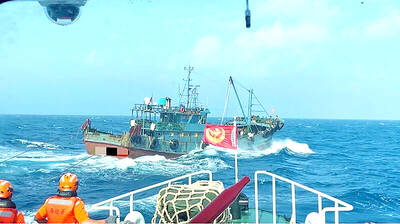The US and its allies need to accelerate the delivery of weapons to Taiwan in the next few years to help Taipei defend itself, the top US general said yesterday.
“The speed at which we, the United States, or other countries assist Taiwan in improving [its] defensive capabilities, I think that probably needs to be accelerated in the years to come,” US General Mark Milley, chairman of the US Joint Chiefs of Staff, told reporters during a visit to Tokyo.
Milley said Taiwan needed weapons like air defense systems and those that could target ships from land.

Photo: AP
“I think it’s important that Taiwan’s military and their defensive capabilities be improved,” he said.
Taiwan has since last year complained of delays to US weapons deliveries, such as Stinger anti-aircraft missiles, as manufacturers directed supplies to Ukraine as it battles invading Russian forces.
The issue has concerned some US lawmakers.
Taiwan has said that its defense spending this year would focus on preparing weapons and equipment for a hypothetical “total blockade” by China, including parts for F-16 warplanes and replenishing weapons.
China staged war games around Taiwan in August last year, firing missiles over Taipei, and declaring no-fly and no-sail zones in an apparent simulation of how it would seek to cut Taiwan off from the rest of the world.
In the past few days, China’s military has been practicing joint force operations at sea ahead of Taiwan’s annual war games at the end of the month, when it would simulate breaking a Chinese blockade.
Milley said that relations between Washington and Beijing were at a “very low point” and diplomatic meetings, including between US Secretary of State Antony Blinken and Chinese Central Foreign Affairs Commission Director Wang Yi (王毅), were important to reduce the chances of escalation.
The US is looking at whether it needs to change where some US forces are based in the Asia-Pacific region, he said.
The majority of US forces in the region are in northeast Asia, including 28,500 in South Korea and 56,000 in Japan.
“We are seriously looking at potential alternative basing options,” Milley said.
In Jakarta, Blinken called for stability in the Indo-Pacific region.
“We must uphold freedom of navigation in the South and East China seas, and maintain peace and stability across the Taiwan Strait,” he said.
In other news, the Ministry of Foreign Affairs thanked the EU and Japan for underlining the importance of peace and stability across the Taiwan Strait.
European Council President Charles Michel, European Commission President Ursula von der Leyen and Japanese Prime Minister Fumio Kishida met in Brussels on Thursday for the 29th summit between the EU and Japan, after which they released a joint statement.
"We underscore the importance of peace and stability across the Taiwan Strait as indispensable to security and prosperity in the international community,” the statement said.
The three leaders expressed concern about the situation in the region and strong opposition to “any unilateral attempts to change the status quo by force or coercion, and increase tensions that could undermine regional stability and the international rules-based order.”
The EU and Japan maintain their positions on Taiwan and the “one China” policy, while calling for the peaceful resolution of cross-strait issues, it said.
They also mentioned militarization, coercion and intimidation in the South China Sea, calling on all parties to respect international law, and to maintain freedom of navigation and overflight, it said.
In Taipei, the ministry welcomed the statement yesterday and thanked the EU and Japan.
The EU in European Council conclusions released on June 30 had voiced concern over growing tensions in the Taiwan Strait.
The joint statement published after a May 22 summit between the EU and South Korea also underscored “the importance of preserving peace and stability across the Taiwan Strait.”
These statements demonstrate that cross-strait peace has become the consensus of EU member states, and the focus of high-level exchanges between the EU, China and nations in the Indo-Pacific region, the ministry said.
Taiwan occupies a core position within the first island chain, and plays a key role in the security and prosperity of the Indo-Pacific region, it said.
Taiwan would continue to cooperate with like-minded partners such as Japan and the EU to safeguard democratic values and to maintain peace, stability and prosperity in the region, it said.

POLITICAL AGENDA: Beijing’s cross-strait Mid-Autumn Festival events are part of a ‘cultural united front’ aimed at promoting unification with Taiwan, academics said Local authorities in China have been inviting Taiwanese to participate in cross-strait Mid-Autumn Festival celebrations centered around ideals of “family and nation,” a move Taiwanese academics said politicizes the holiday to promote the idea of “one family” across the Taiwan Strait. Sources said that China’s Fujian Provincial Government is organizing about 20 cross-strait-themed events in cities including Quanzhou, Nanping, Sanming and Zhangzhou. In Zhangzhou, a festival scheduled for Wednesday is to showcase Minnan-language songs and budaixi (布袋戲) glove puppetry to highlight cultural similarities between Taiwan and the region. Elsewhere, Jiangsu Province is hosting more than 10 similar celebrations in Taizhou, Changzhou, Suzhou,

The Republic of China (ROC) is celebrating its 114th Double Ten National Day today, featuring military parades and a variety of performances and speeches in front of the Presidential Office in Taipei. The Taiwan Taiko Association opened the celebrations with a 100-drummer performance, including young percussionists. As per tradition, an air force Mirage 2000 fighter jet flew over the Presidential Office as a part of the performance. The Honor Guards of the ROC and its marching band also heralded in a military parade. Students from Taichung's Shin Min High School then followed with a colorful performance using floral imagery to represent Taiwan's alternate name

COGNITIVE WARFARE: Chinese fishing boats transmitting fake identification signals are meant to test Taiwan’s responses to different kinds of perceived incursions, a report said Chinese vessels are transmitting fake signals in Taiwan’s waters as a form of cognitive warfare, testing Taipei’s responses to various types of incursions, a report by the Institute for the Study of War said on Friday. Several Chinese fishing vessels transmitted fake automatic identification system (AIS) signals in Taiwan’s waters last month, with one mimicking a Russian warship and another impersonating a Chinese law enforcement vessel, the report said. Citing data from Starboard Maritime Intelligence, the report said that throughout August and last month, the Chinese fishing boat Minshiyu 06718 (閩獅漁06718) sailed through the Taiwan Strait while intermittently transmitting its own AIS

CHINESE INFILTRATION: Medical logistics is a lifeline during wartime and the reported CCP links of a major logistics company present a national security threat, an expert said The government would bolster its security check system to prevent China from infiltrating the nation’s medical cold chain, a national security official said yesterday. The official, who wished to stay anonymous, made the remarks after the Chinese-language magazine Mirror Media (鏡周刊) reported that Pharma Logistics (嘉里醫藥物流) is in charge of the medical logistics of about half of the nation’s major hospitals, including National Taiwan University Hospital and Taipei Veterans General Hospital. The company’s parent, Kerry TJ Logistics Co (嘉里大榮物流), is associated with the National Committee of the Chinese People’s Political Consultative Conference (CPPCC) and the Chinese People’s Liberation Army (PLA), the